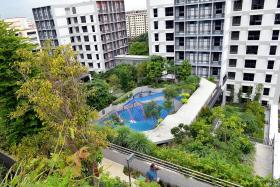S'pore farms team up to raise standards
New farming federation to represent agri-food firms
Farmers are banding together to improve the small but important agriculture sector here.
Twenty farms from the livestock, food fish and vegetable sectors have come together to form a farming federation, the Singapore Agro-Food Enterprises Federation (Safef).
Members include egg farm Seng Choon Farm, Rong-Yao Fisheries and vegetable farm Sustenir Agriculture (Singapore).
There is another farming coalition, the Kranji Countryside Association, which was formed in 2005 to look after the interests of agri-businesses in the rural north-west. But the new federation will represent agri-food enterprises across Singapore.
It will work with the Agri-Food and Veterinary Authority (AVA), research institutions and institutes of higher learning in four main areas: standard-setting, boosting productivity and lowering costs, building capacity and developing manpower, and promoting local produce.
Marine Life Aquaculture managing director Frank Tan, one of Safef's founding members, said setting standards can help ensure food safety, especially with the move towards more productive forms of farming, such as land-based food-fish farming and indoor vegetable farming.
There are more than 200 food farms here, producing less than 10 per cent of Singapore's total food demand.
Though small, the local agricultural sector is an important pillar of Singapore's food security strategy, with climate change wreaking havoc on global food supplies.
On whether the member farms - just 10 per cent of the total number of food farms here - will be able to make an impact in helping to ensure Singapore's food security, Mr Tan said he is confident they will, as they produce a large proportion of the current food supply.
The four hen and quail egg farms in Safef, for instance, produce almost all of the locally produced eggs here, while the six fish farms in the group are responsible for some 70 per cent of fish produced in Singapore, said Mr Tan.
The 10 vegetable growers in Safef produce 50 per cent of locally produced vegetables.
BEST PRACTICES
"We want to help the other farms by conducting talks and sharing best practices, to raise the standard of farming so we can produce safe food and increase food productivity," said Mr Tan.
Safef also wants to boost local demand for home-grown produce here by working with AVA to carry out regular farmers' markets, and developing a logo that could help consumers easily identify locally grown produce.
Senior Minister of State for National Development and Trade and Industry Koh Poh Koon, who is in charge of farming issues, is the honorary adviser to the new farming federation.
Yesterday, he urged Singaporeans to buy local, saying that doing so could help reduce the carbon footprint from importing goods and support local farmers keen on expanding production.
Dr Koh said: "Here, the AVA has control over the quality of the produce, so consumers can also look forward to fresher and safer food produce."
Get The New Paper on your phone with the free TNP app. Download from the Apple App Store or Google Play Store now


